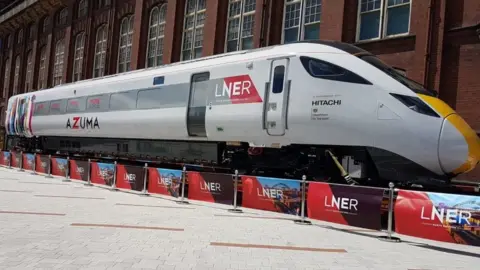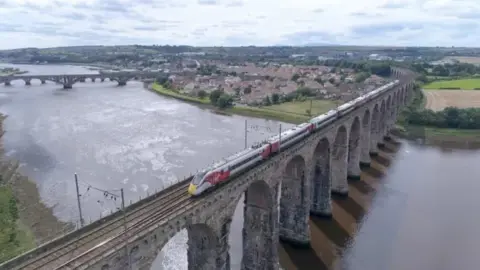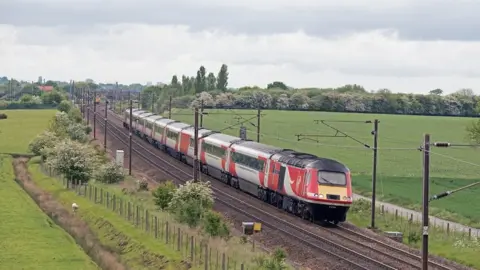East Coast Azuma trains thwarted by northern track
 Hitachi
HitachiNew trains planned for the East Coast mainline do not work properly with track-side equipment, it has emerged.
The Azuma trains cause electromagnetic interference to older signals and points in the north of England.
This means the electro-diesel trains can only run on diesel, travelling much more slowly than their promised speed.
Network Rail said it was working with Japanese train manufacturer Hitachi to fix the problem but it was too early to identify a solution.
"We are committed to delivering improved passenger services and are working on a long-term solution," a spokesperson said.
"In the meantime, the new trains continue to be tested on the East Coast mainline."
The problem affects equipment that registers passing trains and instructs signals and points accordingly.
The older system used on the line north of York does not work with the new trains when they operate on electric power.
 Hitachi
HitachiFormer Labour transport secretary Lord Adonis said he had ordered the new trains 10 years ago.
"They had 10 years to get these signalling issues right," he added.
"They'll be much more expensive to operate, they'll be slower, they'll have less capacity and hundreds of millions of pounds of public money has been wasted again.
"This should be sorted out and it's [transport secretary] Chris Grayling's responsibility."
Mr Grayling admitted there were "teething problems in the same way we had teething problems on the Great Western line".
He said: "We have started to move towards greater integration between track and trains. The new franchises involve much closer working between Network Rail - the track operator - and the train companies.
"The North needs and deserves better railways. It's getting new trains, it's getting investment, it doesn't happen overnight."
 The Carlisle Kid/Geograph
The Carlisle Kid/GeographThe new trains are being assembled at Hitachi's plant in Newton Aycliffe in County Durham.
At expected speed they would reduce the journey time from Edinburgh to London by 22 minutes to four hours, the company said.
Network Rail said they were still due to be rolled out by the end of the year.
It added: "Electromagnetic emissions from the train are interfering with existing safety critical systems - a fact confirmed by the independent report.
"It is Hitachi's responsibility to demonstrate that the IEP trains can run safely on the East Coast mainline, and we believe that this issue can only be fixed on the train. "
Hitachi said: "There are a number of 30-year old signalling systems on the East Coast mainline which require modifying to operate with modern electric trains - which has been confirmed by an independent report.
"Network Rail is planning to carry out this modification work before the Azuma trains enter into passenger service. This is the same issue encountered 15 years ago when the Pendolino was introduced on the West Coast mainline.
"Whilst testing started over 12 months ago, this issue has been identified by Network Rail only recently during multi-train testing. Hitachi is working hard to support Network Rail to overcome this interface issue"
The line is now run by the government as London North Eastern Railway (LNER) after a partnership between Stagecoach and Virgin ran into financial difficulties.
It was the third time in 12 years that a deal to run the route had not been successful.
GNER had a £1.35bn, 10-year franchise taken back by the government in 2006. At the time it was the biggest contract in European railway history.
National Express then agreed a £1.4bn deal in 2007, only to hand it back to the government in 2009 during the financial crisis.
Inside Out in the North East and Cumbria is on BBC One at 19:30 BST on Monday and on the iPlayer for 30 days thereafter.
